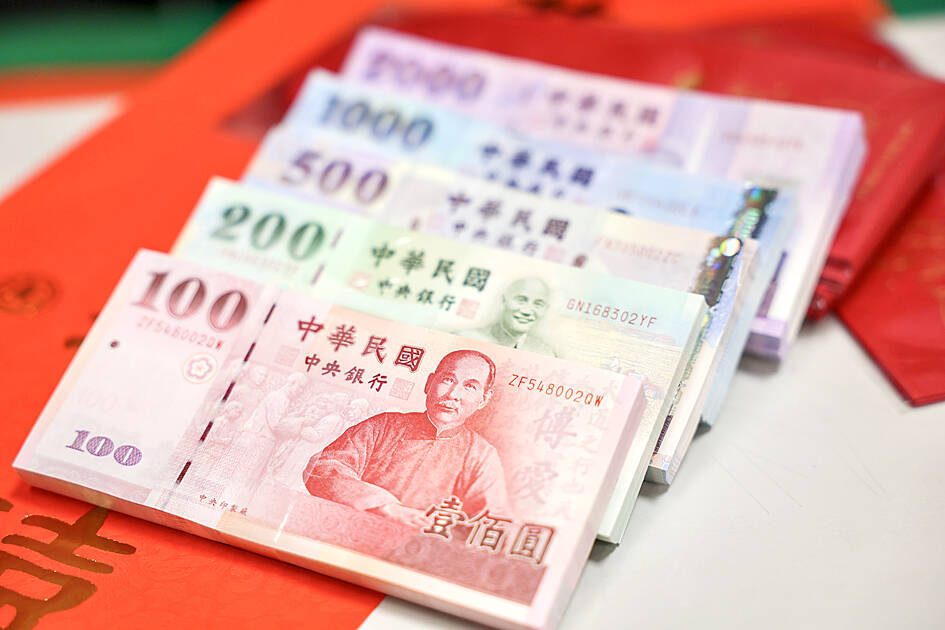Average regular wages last year reached NT$46,450 (US$1,421) per month, a 2.77 percent increase, the biggest rise in 25 years, while average total wages, including bonuses and overtime pay, climbed 4.39 percent to NT$60,984, the biggest jump in 14 years, the Directorate-General of Budget, Accounting and Statistics (DGBAS) said in a report yesterday.
The manufacturing industry, which hired most workers, was the main wage growth driver, as local tech firms benefited from the boom in demand for electronics used in artificial intelligence, DGBAS Census Department Deputy Director Tan Wen-ling (譚文玲) said.
After adjusting for inflation, real regular wages rose 0.58 percent, the best in four years, while real total wages saw a 2.16 percent uptick, the fastest in six years, the statistics agency said.

Photo: CNA
Median wages, a better gauge of typical regular pay, as it is not skewed by extremely high or low wages, was NT$37,274, rising 3.29 percent from the previous year, it said.
By sector, financial and insurance companies recorded the strongest increase at 5.44 percent in take-home pay, as they improved operational and financial performances, and distributed higher bonuses, the report said.
Firms in transportation and warehousing, and wholesale and retail also saw sizeable gains of 3.56 percent and 3.44 percent respectively, it said.
In terms of total monthly compensation, financial and insurance companies topped the ranking, with their wages rising 9.27 percent to NT$107,348.
Meanwhile, total wages for electronic component suppliers recorded a 7.88 percent pickup above the NT$100,000 mark, the report said.
Total compensation at airlines saw a solid 5.4 percent rise to NT$65,305 per month, as Taiwanese like to travel abroad, Tan said, adding that workers at domestic shipping companies also received generous compensations, although they increased less than they did in 2023.
On the other hand, low-paying companies included restaurants and hotels, with monthly pay of NT$34,322, and hairdressers at NT$35,811, the agency said.
Restaurants and hotels also had the lowest median monthly wages at NT$30,960 and NT$31,441 respectively, as they keep relatively high ratios of part-timers, it added.
At the same time, the number of workers hired by the industrial and service sectors stood at 8.45 million last year, representing a 0.41 percent increase, or 34,000 people, from a year earlier, the agency said.
Service providers raised their headcounts by 1.04 percent, while manufacturers shrank their payroll by 0.5 percent, as non-tech sectors in Taiwan took a hit from China’s overproduction and sluggish market demand.

Zhang Yazhou was sitting in the passenger seat of her Tesla Model 3 when she said she heard her father’s panicked voice: The brakes do not work. Approaching a red light, her father swerved around two cars before plowing into a sport utility vehicle and a sedan, and crashing into a large concrete barrier. Stunned, Zhang gazed at the deflating airbag in front of her. She could never have imagined what was to come: Tesla Inc sued her for defamation for complaining publicly about the vehicles brakes — and won. A Chinese court ordered Zhang to pay more than US$23,000 in

Taiwan Semiconductor Manufacturing Co (TSMC, 台積電) yesterday said that its investment plan in Arizona is going according to schedule, following a local media report claiming that the company is planning to break ground on its third wafer fab in the US in June. In a statement, TSMC said it does not comment on market speculation, but that its investments in Arizona are proceeding well. TSMC is investing more than US$65 billion in Arizona to build three advanced wafer fabs. The first one has started production using the 4-nanometer (nm) process, while the second one would start mass production using the

US President Donald Trump has threatened to impose up to 100 percent tariffs on Taiwan’s semiconductor exports to the US to encourage chip manufacturers to move their production facilities to the US, but experts are questioning his strategy, warning it could harm industries on both sides. “I’m very confused and surprised that the Trump administration would try and do this,” Bob O’Donnell, chief analyst and founder of TECHnalysis Research in California, said in an interview with the Central News Agency on Wednesday. “It seems to reflect the fact that they don’t understand how the semiconductor industry really works,” O’Donnell said. Economic sanctions would

‘NO DISRUPTION’: A US trade association said that it was ready to work with the US administration to streamline the program’s requirements and achieve shared goals The White House is seeking to renegotiate US CHIPS and Science Act awards and has signaled delays to some upcoming semiconductor disbursements, two sources familiar with the matter told reporters. The people, along with a third source, said that the new US administration is reviewing the projects awarded under the 2022 law, meant to boost US domestic semiconductor output with US$39 billion in subsidies. Washington plans to renegotiate some of the deals after assessing and changing current requirements, the sources said. The extent of the possible changes and how they would affect agreements already finalized was not immediately clear. It was not known